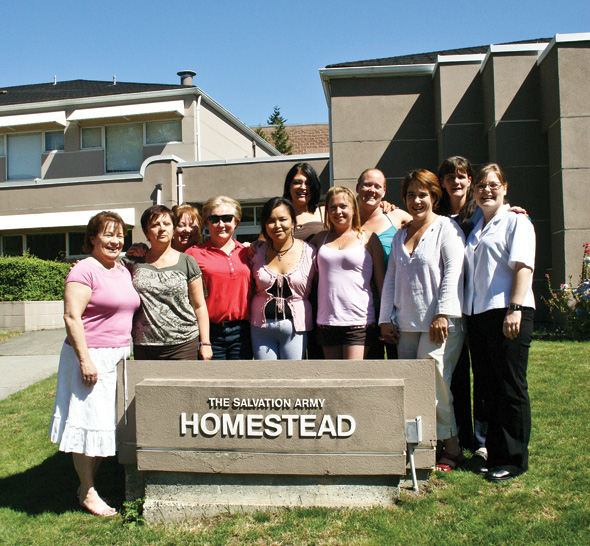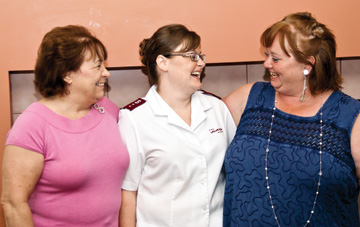
Overcoming Addictions
At the Vancouver Homestead, women begin new lives free from drugs and alcohol
In some ways, the stories that emerge from the Vancouver Homestead are the same as one might hear from any addictions facility. One resident is clean for the first time in 30 years. Another returns to school and then to work. Others are reunited with family and children. But there's another part of these stories that needs to be told, and that's what the Homestead is there to talk about—the experience of being a woman in addiction.
Unlike most Salvation Army addictions facilities, the Homestead is geared specifically to women. “Women come to treatment programs with different issues than we see in a lot of men,” explains Captain Jennifer Canning, executive director. A gender-specific program allows counsellors to target those issues. One of the biggest factors connected with women's substance abuse is their relationship with their children. “Many of the women we see have children who are in the care of someone else, or who are in the care of the Ministry of Child and Family Services,” adds Captain Canning. Often, residents are motivated to complete the program in order to be reunited with children they've lost through drug or alcohol abuse.
Heather Guthrie, who graduated from the Homestead in 2003 and now works there as a counsellor and chaplain, has felt the pain of that separation. Her youngest child was in foster care when she entered the Homestead. “When my daughter visited sometimes she would cry,” recalls Guthrie, “but I wouldn't try to fix her. I'd just say, yes, it hurts. When she left I'd break down with my peers. The women's biggest guilt is the harm they've caused their children, and yet, inside, many of them are little girls who were harmed themselves.”
Sexual trauma is a major factor for the residents of the Homestead. “Nearly all of the women that we see have been sexually exploited at some point, many of them from a young age,” says Captain Canning.
Monika Ulrich, program director, explains that “women who have trauma tend to use addiction to cope,” and conversely, women in addiction are more vulnerable to sexual abuse. As a result, it's important that ending the reliance on drugs go hand-in-hand with addressing trauma.
The female-only community at the Homestead creates an atmosphere of empowerment and support for the residents. Lisa, who graduated from the Homestead's program and now lives in its second-stage housing, says that she became used to seeing women as rivals for men's attention. “I thought that being an object to a man was the important thing, but now I'm realizing that women are very powerful people,” she says. “In community, we can all help each other and build on each other's strengths.”
“I needed the support of other women,” agrees Guthrie. “I needed people to tell me that the addict was not who I really was.”
Because residents live together and witness each other's recoveries, they are able to build up a support network during their stays. “Women of all walks of life can identify on a very deep level when we have common threads of addiction,” Guthrie says. As an example, Ulrich points to a 70-year-old from an affluent neighbourhood and another resident who came into the program off the streets. Despite their different backgrounds, they now live together at the Homestead.
This connection continues after residents graduate. Alumni will often come back and join programs, visit chapel or volunteer. Some, like Guthrie, go on to work there. “I get to give back to the women, to share the importance of supporting and loving each other,” she says. “There's nothing better.”
The second-stage housing, a separate part of the Homestead building, is another way to maintain a supportive connection. By giving residents independent apartments within a safe environment, this second stage allows them to live on their own without being thrown into an unstructured lifestyle too quickly. “When I find life too overwhelming,” says Lisa, “I can come back, feel secure and get the counselling I need.”

The Homestead is founded on the strong belief that everyone is equal in God's eyes. As a Salvation Army facility, the Homestead emphasizes the spiritual aspect of the journey to recovery. “These women come needing spiritual healing as much as they need physical and emotional healing,” says Captain Canning. The centre holds mandatory devotions and chapel every week. “It teaches women to slow down, to focus on something greater than themselves.”
Guthrie says that the Homestead helped foster her faith journey, which has been a source of support for her as she's created a new life without drugs. “Sometimes I don't know how I would have gotten through had I not had some faith,” she says. As a counsellor and chaplain, she now shares that faith with the Homestead's residents. She tells them about her own experience, that “God can take all the bad things that have happened in my life and make something wonderful and good out of them.”
Lisa also found spiritual strength at the Homestead. One day after a group discussion about their mothers—a very difficult session for Lisa, whose mother had overdosed when she was young—she felt that the past traumas of her life were too strong to handle without the help of drugs. But then she started to pray. “In my weakest moment, I found the most strength in myself through prayer,” she says.
Captain Canning feels that she, too, has grown spiritually from her time working at the Homestead. “There's so much stigma attached to addiction,” she says, “but the closer you get with people who are walking the recovery journey, the more you realize that we all have common ground. At the end of the day, we all stand before God as equals.”
It's a belief instilled in all the women at the Homestead. “We learn that everybody has equal value and to live with everybody's best interests at heart,” Lisa says.
Gateway to Freedom
Deborah's Gate offers a new start for women who have been sexually trafficked
Deborah's Gate, which opened in Vancouver last December, is the only Canadian safe house specifically operated for survivors of sexual trafficking, as far as its founders are aware. “Deborah's Gate exists for women who have the desire to escape trafficking and who need a safe place to stay,” explains Delaine Milette, social justice co-ordinator, British Columbia Division. This safe house is a central component of the anti-human trafficking campaign in the division. “We can preach all we want, but without a secure place for women to come to, there is no escape for them.”
Deborah's Gate is named after the biblical figure of Deborah (see Judges 4-5), a strong and just woman. “It's a Christ-centred community built on caring and sharing,” says the supervisor of the program. The 10-bed facility offers programming tailored to the needs of the women, including spiritual care, withdrawal management, ESL services, literacy and life-skill development, support groups, and access to trauma counselling, medical care, dental care, addiction services, pro bono legal services, translation, immigration and refugee services, and one-on-one meetings with the direct care workers. Women are recommended to the program through the RCMP, local police, NGOs and ministry units, but in the future, it's hoped that more women will hear about the house and seek it out. One of the biggest challenges is raising awareness about Deborah's Gate without compromising its security.
“These people are often afraid for their lives,” says Major Winn Blackman, divisional secretary for women's ministries, British Columbia Division, and chair of the committee behind the creation of Deborah's Gate. “Our hearts just break for some of them.” But since its inception, Deborah's Gate has seen progress. Some residents of the program have secured employment and Major Blackman hopes that others will graduate from the program and move into the community soon. Milette is also hopeful. “We've seen a tremendous amount of healing in people's lives here.”
Safe Haven
At Kate Booth House, women and children find refuge from domestic violence
On her first day as executive director of Kate Booth House, Major Marjory Peddle walked through the door of the facility and saw a small girl with a black eye standing in front of her. “My heart just went to my feet,” she says.
Kate Booth House can be a difficult place to work. For 25 years, it has provided a safe place for women and children fleeing from domestic violence. The clients of the residence span all different backgrounds and nationalities, and Major Peddle says that as well as being physically injured, many of the women are embarrassed and ashamed, “consumed with thinking, 'I've actually left my husband.' ”
When each client enters Kate Booth House, she's assigned to a day counsellor who works with her throughout her month-long stay. Priscilla Belonio, program director, says that, on a typical day at the centre, one woman might go to immigration services to apply for refugee status and another might go to court over custody of her children. Others search for housing or funding through social services. “Some women find housing at Esther Place,” says Belonio, “which is a set of four apartments that provide second-stage housing for families who have been through Kate Booth House. In the evenings, these women are invited back to Kate Booth House's programs, such as pampering nights, health lectures delivered by medical students and counselling on the cycle of abuse. The children at the house attend school every morning—a teacher is brought into the building—and group counselling in the afternoons.”
In 2006, the facility moved to a new building with 25 beds, more than double the original number, as well as increased security and rooms for family activities, women's gatherings and prayer. Kate Booth House has also hired new staff, such as an outreach worker, a cook and a spiritual practitioner who speaks to the women about their faith.
The centre still deals with the same challenges, particularly balancing the needs of mothers and their children. Often, children are terrified of separation from their mothers. “Some will just sit in the corner and look at you, and scream if you come near them,” Major Peddle says. The children's counsellors work to get children of all ages involved with activities they express interest in.
Just as on Major Peddle's first day, there are times at Kate Booth House when it's hard to keep going, but Major Peddle and Belonio are supported by their calling to this work. “It's my ministry,” says Belonio, “encouraging the women and helping them to heal.”









Leave a Comment